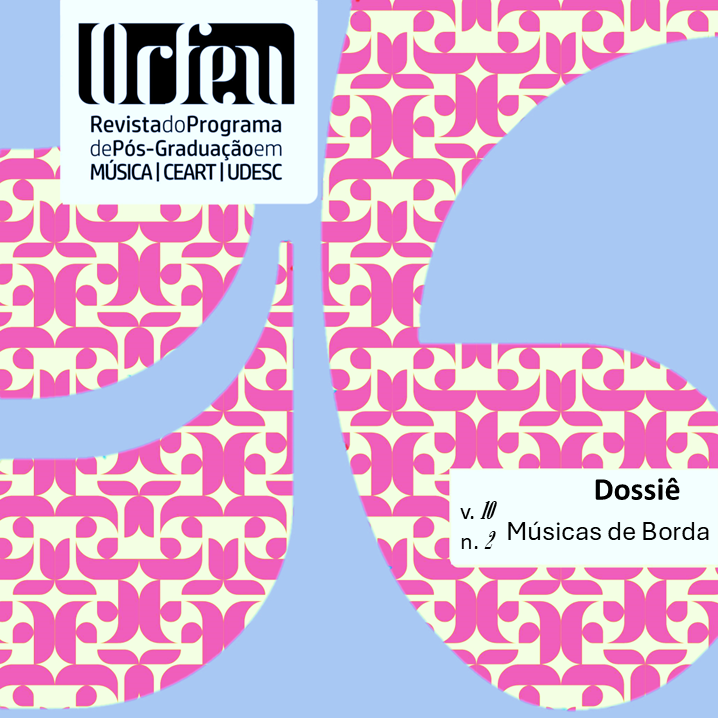Orchestral musicians and the art of relationships
DOI:
https://doi.org/10.5965/2525530410022025e0202Keywords:
Orchestra, Musicians, Subjective success, interpersonal relationships, musical workAbstract
This article investigates the interpersonal relationships experienced in the daily lives of Brazilian orchestra musicians and their connections with different forms of subjective perception of success. The research adopts a sequential mixed method, with the application of a questionnaire and semi-structured interviews. The qualitative analysis, based on thematic axes, reveals tensions between cooperation and competition, hierarchy and autonomy, suffering and fulfillment. The participants' statements show that institutional and relational conditions directly impact the work experience and the meanings attributed to a musical career. The study contributes to the understanding of the orchestral field as a space for symbolic, affective, and political negotiation, in which success is experienced in a plural and relational way.
Downloads
References
ALVARENGA, E.C.; OLIVEIRA, P. T. R.; LIMA, M. L. C. A coragem de ser músico: prazer e sofrimento no trabalho em orquestras sinfônicas. Revista de Psicologia, Fortaleza, v. 9, n. 2, p. 215–223, 2018.
BOMFIM, C. C. A música orquestral, a metrópole e o mercado de trabalho (Tese de Doutorado). Instituto de Artes, UNESP, 2017.
BRINKMANN, S.; KVALE, S. Doing interviews. London, UK: Sage, 2018.
CARTER, T.; LEVI, E. (Org.). The Cambridge companion to the orchestra. Cambridge: Cambridge University Press, 2003.
CHARMAZ, K. Constructing grounded theory. London, UK: Sage Publications, 2006.
CLARKE, E. F. What’s going on: Music, Psychology and Ecological Theory. CLAYTON, M.; HERBERT, T.; MIDDLETON, R. (Orgs.), The Cultural Study of Music, 2nd ed., p. 333 342). New York, NY: Routledge, 2012.
COOK, N. Entre o processo e o produto: Música enquanto performance. (F. Borém, trad.). Per Musi, 14, 5–22, 2006 https://periodicos.ufmg.br/index.php/permusi/issue/archive Recuperado de https://periodicos.ufmg.br/index.php/permusi/issue/archive
COTTRELL, S. Professional music-making in London: ethnography and experience. Aldershot: Ashgate, 2004.
COTTRELL, S. Musical performance in the twentieth century and beyond: an overview. LAWSON, C.; STOWELL, R. (Orgs.), The Cambridge History of Musical Performance. Cambridge, UK: Cambridge University Press, 2012.
CRESWELL, J. W. Research design: qualitative, quantitative, and mixed methods approaches. 2. ed. Thousand Oaks: Sage, 2003.
CRESWELL, J. W.; CLARK, V. L. P. Designing and conducting mixed methods research. 3. ed. Thousand Oaks: Sage, 2018.
GAUNT, H.; DOBSON, M. C. Orchestras as “ensembles of possibility”: Understanding the experience of orchestral musicians through the lens of communities of practice. Mind, Culture, and Activity, 21(4), 2014. doi: 10.1080/10749039.2014.951900
GIBBS, G. Análise de dados qualitativos. Porto Alegre, RS: Artmed, 2009.
GILLINSON, C.; VAUGHAN, J. The life of an orchestral musician. In C. Lawson (Org.), The Cambridge companion to the orchestra. Cambridge, UK: Cambridge University Press, 2003.
GUNZ, H.; HESLIN, P. A. Reconceptualizing career success. Journal of Organizational Behavior, 26(2), 105–111, 2005. doi: 10.1002/job.300
HOLST, B. S. et al. Depression and performance anxiety in professional orchestra musicians. Medical Problems of Performing Artists, v. 27, n. 2, p. 91–97, 2012.
HUGHES, E. C. Men and their work. Glencoe: Free Press, 1958.
KENNY, D. T.; DRISCOLL, T.; ACKERMANN, B. Psychological well-being in professional orchestral musicians in Australia: a descriptive population study. Psychology of Music, v. 42, n. 2, p. 210–232, 2014.
KOIVUNEN, N.; WENNES, G. Show us the sound! Aesthetic leadership of symphony orchestra conductors. Leadership, v. 7, n. 1, p. 51–71, 2011.
KRONEMBERGER, G. A. OPES, uma Sociologia dos músicos de orquestra (Dissertação de Mestrado). Universidade Federal do Rio de Janeiro, 2014.
LAGE, M. C.; GODOY, A. S. O uso do computador na análise de dados qualitativos: questões emergentes. RAM. Revista de Administração Mackenzie, 9(4), 75–98, 2008. doi: 10.1590/s1678-69712008000400006
LEHMANN, B. L’orchestre dans tous ses éclats: enquête sur la condition professionnelle des musiciens d’orchestre. Paris: La Documentation Française, 2012.
O’NEILL, S.; SLOBODA, J. Responding to performance: Listeners and audiences. RINK, J.; GAUNT, H.; WILLIAMON, A. (Orgs.) Musicians in the making: pathways to creative performance (p. 186–205). New York, NY: Oxford University Press, 2017.
SAWYER, K. R. Musical performance as collaborative practice. BARRET, M. (Org.), Collaborative creative thought and practice in music. Surrey, UK: Ashgate, 2014.
SEGNINI, L. R. P. Os músicos e seu trabalho: Diferenças de gênero e raça. Tempo Social, 26(1), 75–86, 2014.. doi: 10.1590/S0103-20702014000100006
SENNETT, R. Juntos: os rituais, os prazeres e a política da cooperação. Rio de Janeiro: Record, 2012.
SMALL, C. Musicking: the meanings of performing and listening. Middletown: Wesleyan University Press, 1998.
SPITZER, J.; ZASLAW, N. The birth of the orchestra: history of an institution, 1650–1815. Oxford: Oxford University Press, 2004.
SPURK, D.; HIRSCHI, A.; WANG, M.; VALERO, D.; KAUFFELD, S. Latent profile analysis: A review and “how to” guide of its application within vocational behavior research. Journal of Vocational Behavior, 120, 103445, 2020. doi: 10.1016/j.jvb.2020.103445
STRUBLER, D. C.; EVANGELISTA, R. Maestro Neeme Jarvi on Leadership. Journal of Management Inquiry, 18(2), 119–121, 2009. doi: 10.1177/1056492609333413
Downloads
Published
How to Cite
Issue
Section
License
Copyright (c) 2025 Mariana Bergsten Mendes Félix, Tania Casado, Fábio Cury

This work is licensed under a Creative Commons Attribution 4.0 International License.
Authors who submit their manuscripts to be published in this journal agree to the following terms:
1. Authors retain the copyright and grant to the journal the right of first publication, whilst simultaneously permitting their work to be licensed under the Creative Commons License Attribution, which allows the sharing of work with recognition of the authorship and initial publication in this journal.
2. Contributions in this journal are open access; this means they are based in free use, and non-commercial applications.






